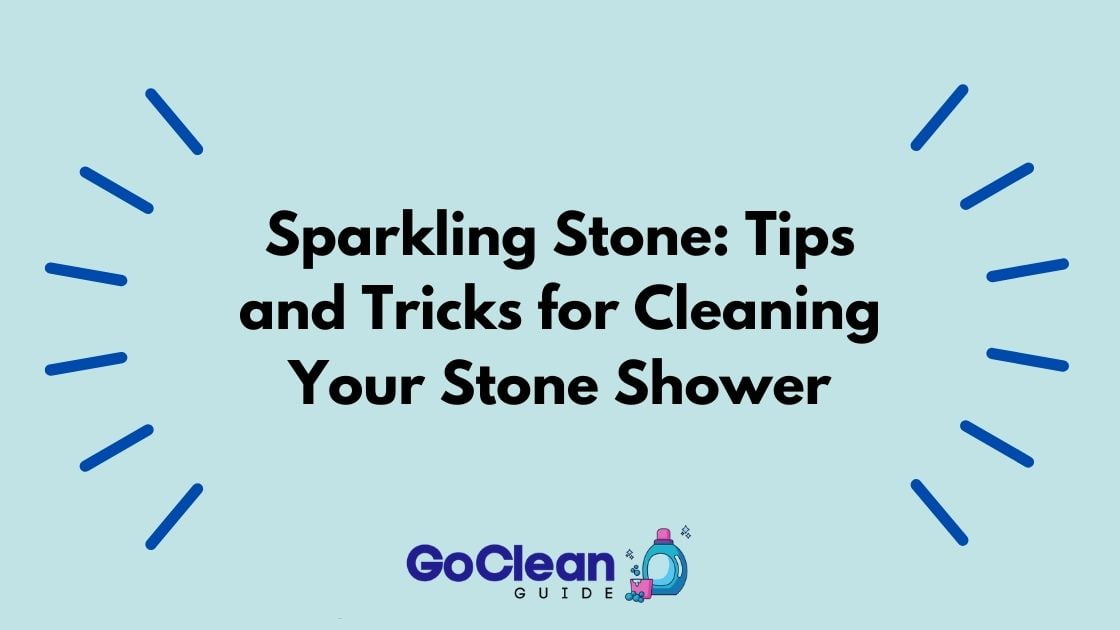The Beauty of a Sparkling Stone Shower
Stone showers are a luxurious addition to any bathroom. The natural beauty and elegance of stone can transform an ordinary shower into a stunning focal point. However, in order to keep your stone shower looking its best, regular cleaning and maintenance are essential. By taking proper care of your stone shower, you can ensure that it remains sparkling and beautiful for years to come.
Why Regular Cleaning is Important for Your Stone Shower
Regular cleaning is important for maintaining the beauty of your stone shower. Soap scum, hard water stains, and other buildup can dull the shine of the stone and make it appear dirty and unattractive. Additionally, if left untreated, these substances can actually damage the stone surface over time.
In a moist environment like a shower, mold and mildew can also become a problem if not properly cleaned. These fungi not only look unsightly, but they can also pose health risks. Mold and mildew thrive in damp conditions, so it is important to keep your stone shower clean and dry to prevent their growth.
The Dos and Don’ts of Stone Shower Cleaning
When it comes to cleaning your stone shower, there are some important dos and don’ts to keep in mind. First and foremost, it is important to use the right cleaning products and tools for the job. Avoid using harsh chemicals or abrasive scrubbers that can scratch or etch the stone surface. Instead, opt for gentle cleaners specifically designed for use on stone.
It is also important to avoid using too much water when cleaning your stone shower. Excessive moisture can seep into the stone and cause damage over time. Instead, use a damp cloth or sponge to clean the surface, and dry it thoroughly afterwards.
Natural Cleaning Solutions for Your Stone Shower
If you prefer to use natural cleaning solutions in your home, there are several options that are safe and effective for cleaning your stone shower. Vinegar, baking soda, and lemon juice are all natural ingredients that can be used to clean and disinfect stone surfaces.
To remove soap scum and hard water stains, mix equal parts vinegar and water in a spray bottle. Spray the solution onto the stone surface and let it sit for a few minutes before scrubbing with a soft brush or cloth. Rinse thoroughly and dry the surface afterwards.
For tougher stains, make a paste with baking soda and water and apply it to the stained area. Let it sit for a few minutes before scrubbing with a soft brush or cloth. Rinse thoroughly and dry the surface afterwards.
How to Remove Tough Stains from Your Stone Shower
Despite regular cleaning, tough stains can still occur on your stone shower. Rust, hard water buildup, and soap scum are common culprits. To remove rust stains, use a specialized rust remover that is safe for use on stone. Follow the instructions on the product carefully, as some rust removers may require multiple applications.
For hard water buildup, mix equal parts vinegar and water in a spray bottle and spray the solution onto the stained area. Let it sit for a few minutes before scrubbing with a soft brush or cloth. Rinse thoroughly and dry the surface afterwards.
To remove stubborn soap scum, make a paste with baking soda and water and apply it to the stained area. Let it sit for a few minutes before scrubbing with a soft brush or cloth. Rinse thoroughly and dry the surface afterwards.
Preventing Mold and Mildew in Your Stone Shower
Preventing mold and mildew growth in your stone shower is essential for maintaining its beauty and preventing health risks. Mold and mildew thrive in damp environments, so it is important to keep your shower well-ventilated and dry.
After each use, wipe down the stone surfaces with a dry cloth or squeegee to remove excess moisture. Leave the shower door or curtain open to allow air to circulate and help the shower dry more quickly.
To prevent mold and mildew growth, you can also use natural anti-fungal solutions. Tea tree oil, vinegar, and hydrogen peroxide are all effective at killing mold and mildew spores. Mix one part of your chosen solution with one part water in a spray bottle and spray it onto the stone surfaces. Let it sit for a few minutes before wiping it clean with a cloth or sponge.
Cleaning and Maintaining Stone Shower Grout
In addition to cleaning the stone surfaces, it is important to keep the grout in your stone shower clean and well-sealed. Grout is porous and can absorb moisture, which can lead to water damage and mold growth if not properly maintained.
To clean grout, mix equal parts vinegar and water in a spray bottle and spray the solution onto the grout lines. Let it sit for a few minutes before scrubbing with a grout brush or toothbrush. Rinse thoroughly and dry the grout afterwards.
To keep grout well-sealed, apply a grout sealer every six months to a year, or as recommended by the manufacturer. This will help prevent moisture from seeping into the grout and causing damage.
Tips for Polishing and Sealing Your Stone Shower
Polishing and sealing your stone shower can help protect it from damage and keep it looking its best. Polishing can restore the shine to dull or worn stone surfaces, while sealing can provide an extra layer of protection against stains and moisture.
Before polishing or sealing your stone shower, it is important to choose the right products and techniques for your specific type of stone. Different types of stone require different care, so be sure to read the manufacturer’s instructions or consult with a professional if you are unsure.
When polishing, use a specialized stone polish that is safe for use on your specific type of stone. Apply the polish according to the instructions on the product, using a soft cloth or sponge. Buff the surface gently until it shines.
When sealing, choose a high-quality stone sealer that is recommended for use on your specific type of stone. Apply the sealer according to the instructions on the product, using a soft cloth or sponge. Allow the sealer to dry completely before using the shower.
Common Mistakes to Avoid When Cleaning Your Stone Shower
When cleaning your stone shower, there are several common mistakes that should be avoided. Using too much water can cause damage to the stone surface over time, so it is important to use a damp cloth or sponge instead of soaking the stone.
Leaving cleaning products on the stone surface for too long can also cause damage. Follow the instructions on the product carefully and rinse thoroughly after cleaning.
Using the wrong type of cleaner can also be detrimental to your stone shower. Harsh chemicals and abrasive scrubbers can scratch or etch the stone surface, so it is important to use gentle cleaners specifically designed for use on stone.
Enjoying Your Sparkling Stone Shower for Years to Come
In conclusion, regular cleaning and maintenance are essential for keeping your stone shower looking its best. By following the dos and don’ts of stone shower cleaning, using natural cleaning solutions, and properly removing tough stains, you can ensure that your stone shower remains sparkling and beautiful.
Preventing mold and mildew growth, cleaning and maintaining grout, and polishing and sealing your stone shower are also important steps in maintaining its beauty and functionality. By avoiding common mistakes and taking good care of your stone shower, you can enjoy its beauty for years to come. So take the time to clean and maintain your stone shower regularly, and you will be rewarded with a stunning and luxurious addition to your bathroom.
FAQs
What is a stone shower?
A stone shower is a shower that is made of natural stone, such as granite, marble, or slate.
Why is it important to clean a stone shower?
It is important to clean a stone shower to prevent the buildup of soap scum, mold, and mildew, which can damage the stone and make it look unsightly.
What tools do I need to clean a stone shower?
To clean a stone shower, you will need a soft-bristled brush, a non-abrasive cleaner, a sponge or cloth, and a squeegee.
What type of cleaner should I use to clean a stone shower?
You should use a non-abrasive cleaner that is specifically designed for use on natural stone. Avoid using acidic or abrasive cleaners, as they can damage the stone.
How often should I clean my stone shower?
You should clean your stone shower at least once a week to prevent the buildup of soap scum, mold, and mildew.
How do I prevent soap scum buildup in my stone shower?
To prevent soap scum buildup in your stone shower, use a squeegee to remove excess water after each use, and avoid using bar soap, as it can leave a residue.
Can I use vinegar to clean my stone shower?
No, you should not use vinegar to clean your stone shower, as it is acidic and can damage the stone. Use a non-abrasive cleaner that is specifically designed for use on natural stone.






